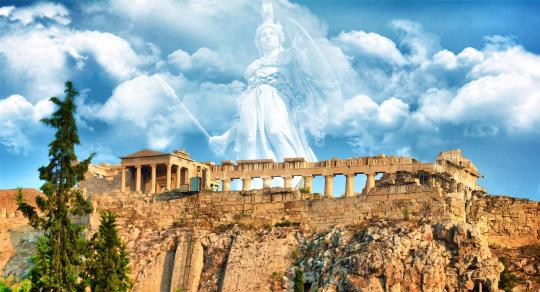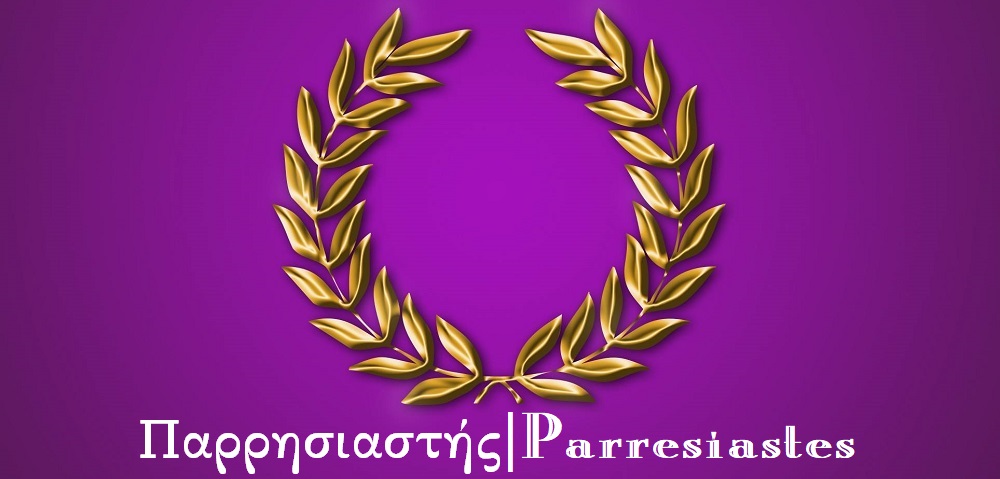
Hellēnismôs is the indigenous culture of Greece, including the Greek virtue system, religion (“polytheism”) and ethos. Hellēnismôs is also the ethnic identity and worldview of the ancient and medieval Hellenes. Hellēnismôs is an indigenous tradition. The term “Hellenismos” means “of the Greeks, Hellenism […]. II. use of a pure Greek style and idiom […].” (Henry George Liddell, Robert Scott: A Greek-English Lexicon, p. 536, 9th edition, Oxford University Press, New York 1996). Simply put, Hellēnismôs is the “greek way of life” (Richard A. Horsley, Paul and Empire, p. 206, Harrisburg 1997). In order to avoid ambiguities, we must specify that by Hellēnismôs we do not mean Romiosyni, Byzantium or modern Greece, but only genuine Hellenic culture, also known as ethnikôs Hellēnismôs (in order to distinguish carefully between Hellenic culture and “christian Hellenism” → Romiosyni).
The Hellenes are an ethnos. The word “ethnos” derives from the ancient Greek éthos which means “character, idiom, behavior.” An “ethnos” is a group of people sharing a common ethos. A Hellene is someone who participates in Hellenic ethos: language, religion, way of life (“speech, and the shrines of gods and the sacrifices that we have in common, and the likeness of our way of life,” Herodotos, 8.144). The Hellenes are polytheists or ethnikoi (lat. ethnici), meaning bearers of a specific ethnic identity based on a specific ethnic ethos, tradition and religion. Hellēnismôs thus refers to Hellenic ethnicum or religion. Orthopraxy, the revitalization of the Hellenic tradition and loyalty towards indigenous Hellenic culture are basic characteristics that all ethnic Hellenes have in common, regardless of whether they are platonists, stoics or members of a different school of philosophy. Hellēnismôs is polytheistic, cosmotheistic and animistic. Hellenic religion is defined as the “Religious beliefs and practices of the ancient Hellenes” (Encyclopaedia Britannica: “Greek Religion”). Hellenic Religion is Minoan-Mycenaean in origin (E.O. James, The Cult Of The Mother Goddess, London 1959).
The principal aim of Hellenic collectives is the full restoration and autonomy of the Hellenic ethnos and identity. The most important Hellenic collective is the Supreme Council of ethnic Hellenes (YSEE), which is a nativistic movement. A nativistic movement is defined as any “conscious, organized attempt on the part of a society’s members to revive or perpetuate selected aspects of its culture” (Ralph Linton: Nativistic Movements, in: American Anthropologist. Vol. 45, no. 2, 1943, p. 230). People’s economic situation, philosophical affiliations, political standpoints or sexual orientations do not concern Hellēnismôs. Ideologies, political parties and artificial modern opposites (such as nationalism-internationalism, capitalism-leninism etc.) are irrelevant to Hellēnismôs, for these things have no place in ethnic religions. “By Ethnic Religion, we mean religion, spirituality, and cosmology that is firmly grounded in a particular people’s traditions. In our view, this does not include modern occult or ariosophic theories/ideologies, nor syncretic neo-religions” (European Congress of Ethnic Religions, ECER: About ECER).
The revitalization of Hellēnismôs is not a return to an undefined “ancient time” or socioeconomic conditions of the past, as one may suspect at first glance, but the return of some people to their homeland’s indigenous culture and identity, and to the civilizing achievements of the Hellenes. Whether yesterday, today or tomorrow, Hellēnismôs is of timeless importance to civilization, because it is in its nature to shape free and upright human beings. Hellēnismôs addresses the whole human being, for it is culture, tradition, religion, worldview, philosophy, language, identity, virtue system and a way of life, and at the same an authentic alternative to the Occident,[1] Orient [2] and Romiosyni.[3]
_
1) Christianity, parliamentarianism, nationalism, internationalism, occultism, neopaganism, New Age.
2) Monotheism, theocracy, mysticism, hermeticism, soteriology, dualism, monasticism.
3) Byzantium, absolutism, “hellenochristian” ideology, archaeocentrism, racial mysticism, ufology.
The Hellenes are an ethnos. The word “ethnos” derives from the ancient Greek éthos which means “character, idiom, behavior.” An “ethnos” is a group of people sharing a common ethos. A Hellene is someone who participates in Hellenic ethos: language, religion, way of life (“speech, and the shrines of gods and the sacrifices that we have in common, and the likeness of our way of life,” Herodotos, 8.144). The Hellenes are polytheists or ethnikoi (lat. ethnici), meaning bearers of a specific ethnic identity based on a specific ethnic ethos, tradition and religion. Hellēnismôs thus refers to Hellenic ethnicum or religion. Orthopraxy, the revitalization of the Hellenic tradition and loyalty towards indigenous Hellenic culture are basic characteristics that all ethnic Hellenes have in common, regardless of whether they are platonists, stoics or members of a different school of philosophy. Hellēnismôs is polytheistic, cosmotheistic and animistic. Hellenic religion is defined as the “Religious beliefs and practices of the ancient Hellenes” (Encyclopaedia Britannica: “Greek Religion”). Hellenic Religion is Minoan-Mycenaean in origin (E.O. James, The Cult Of The Mother Goddess, London 1959).
The principal aim of Hellenic collectives is the full restoration and autonomy of the Hellenic ethnos and identity. The most important Hellenic collective is the Supreme Council of ethnic Hellenes (YSEE), which is a nativistic movement. A nativistic movement is defined as any “conscious, organized attempt on the part of a society’s members to revive or perpetuate selected aspects of its culture” (Ralph Linton: Nativistic Movements, in: American Anthropologist. Vol. 45, no. 2, 1943, p. 230). People’s economic situation, philosophical affiliations, political standpoints or sexual orientations do not concern Hellēnismôs. Ideologies, political parties and artificial modern opposites (such as nationalism-internationalism, capitalism-leninism etc.) are irrelevant to Hellēnismôs, for these things have no place in ethnic religions. “By Ethnic Religion, we mean religion, spirituality, and cosmology that is firmly grounded in a particular people’s traditions. In our view, this does not include modern occult or ariosophic theories/ideologies, nor syncretic neo-religions” (European Congress of Ethnic Religions, ECER: About ECER).
The revitalization of Hellēnismôs is not a return to an undefined “ancient time” or socioeconomic conditions of the past, as one may suspect at first glance, but the return of some people to their homeland’s indigenous culture and identity, and to the civilizing achievements of the Hellenes. Whether yesterday, today or tomorrow, Hellēnismôs is of timeless importance to civilization, because it is in its nature to shape free and upright human beings. Hellēnismôs addresses the whole human being, for it is culture, tradition, religion, worldview, philosophy, language, identity, virtue system and a way of life, and at the same an authentic alternative to the Occident,[1] Orient [2] and Romiosyni.[3]
_
1) Christianity, parliamentarianism, nationalism, internationalism, occultism, neopaganism, New Age.
2) Monotheism, theocracy, mysticism, hermeticism, soteriology, dualism, monasticism.
3) Byzantium, absolutism, “hellenochristian” ideology, archaeocentrism, racial mysticism, ufology.
